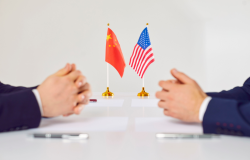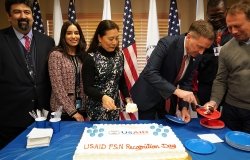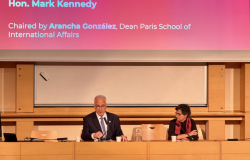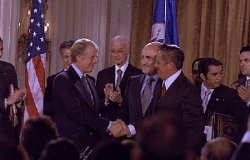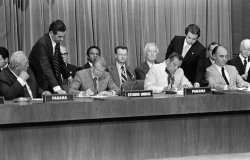What Does the World Expect of President-elect Trump: Africa
Africa Expects:
- Assistance from the United States to consolidate and institutionalize democratic governance.
- The United States to broaden its historically narrow and negative view of the continent.
- Deeper economic and development engagement with Africa.
Q: What is the greatest challenge facing the U.S. relationship with Africa?
A: One of the greatest challenges facing the United States relationship with Africa is the historically narrow and negative lens through which Africa has been viewed. As a result, conflict and humanitarian crises, terrorism, disease, corruption, and crises of governance have predominated the United States’ relationship with the continent. This limited and incomplete view of Africa has obscured opportunities for more a more robust and mutually beneficial relationship. While some countries continue to experience serious challenges, Africa is not a charity case. It is a continent undergoing tremendous transformation in the socio-economic and political spheres, and includes several of the fastest growing economies in the world over the past decade. And, while U.S. administrations have recognized and taken steps to engage with Africa’s transformation in recent years, much more work remains in order to fully realize the potential of the United States relationship with Africa.
Q:What will the next president need to do to manage these obstacles or expectations?
A: It would be wise for the next administration to take stock of the strengths and weaknesses of U.S.-Africa relations. Such an assessment should evaluate the negative narratives about Africa and the ways in which this negatively-driven engagement model has hindered opportunities for mutually beneficial relations between the United States and Africa. The Trump Administration should also seek to understand the nature, scope, and nuance of the transformation occurring on the continent in the socio-economic and political spheres. More importantly, the administration should seek to expand our current framework for engagement with Africa to center more on the positive elements of Africa’s transformation, and continue support to, or provide new, resources and tools to support this broader and more balanced framework. As part of this exercise, 4 key questions deserve special focus:
I. The U.S. brand in Africa: What are the core, defining factors by which the United States seeks to be identified in Africa, and what does the Trump administration need to do build that brand?
II. Deepening economic and development engagement with Africa: Why is the United States’ perception of risk in Africa so high compared to the perception of other international partners such as China and the European Union, and how can the United States build on current programs to broaden and deepen its economic engagement with Africa?
III. Adopting more holistic approaches to managing insecurity in Africa: Security issues continue to be a major challenge in various parts of Africa, including terrorism and violent extremism in the Sahel and the Horn of Africa, Boko Haram in Nigeria and the broader West Africa region, but also conflict in the Great Lakes region and the broader Central African region, including the Democratic Republic of the Congo, the Central African Republic, and Burundi. In many cases, these security challenges are tied to issues of governance at the social, economic, and political levels. How can the United States more effectively work with African countries to holistically address insecurity?
IV. The evolving democratic governance in Africa: Africa’s continued transformation hinges on good governance. After much progress on the democratic front in the 1990s and 2000s, Africa is beginning to witness some serious setbacks. While elections have largely become routine (a positive), the quality and impact of democracy has not necessarily followed suit, including an increasing number of leaders who have manipulated constitutions to elongate their stay in power. How can the United States more actively help to consolidate and institutionalize democratic governance in Africa?
Guest
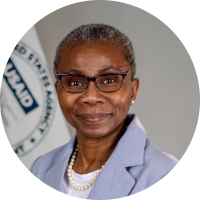
Hosted By

Africa Program
The Africa Program works to address the most critical issues facing Africa and US-Africa relations, build mutually beneficial US-Africa relations, and enhance knowledge and understanding about Africa in the United States. The Program achieves its mission through in-depth research and analyses, public discussion, working groups, and briefings that bring together policymakers, practitioners, and subject matter experts to analyze and offer practical options for tackling key challenges in Africa and in US-Africa relations. Read more



